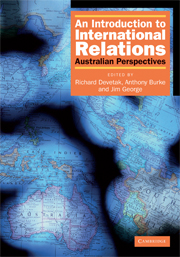Book contents
- Frontmatter
- Contents
- List of tables, figures and boxes
- List of contributors
- Preface and acknowledgments
- An introduction to international relations: the origins and changing agendas of a discipline
- 1 Theory and practice in Australian international relations: the search for identity and security
- Part 1 Theories of international relations
- Part 2 The traditional agenda: states, war and law
- Part 3 The new agenda: globalisation and global governance
- Glossary of terms
- Bibliography
- Index
- References
1 - Theory and practice in Australian international relations: the search for identity and security
- Frontmatter
- Contents
- List of tables, figures and boxes
- List of contributors
- Preface and acknowledgments
- An introduction to international relations: the origins and changing agendas of a discipline
- 1 Theory and practice in Australian international relations: the search for identity and security
- Part 1 Theories of international relations
- Part 2 The traditional agenda: states, war and law
- Part 3 The new agenda: globalisation and global governance
- Glossary of terms
- Bibliography
- Index
- References
Summary
Introduction
This chapter concentrates on Australia's ongoing search for security and identity since the early years of the twentieth century – the traditional context within which Australian international relations theory and practice have been articulated and evaluated. It suggests that significant patterns of continuity and change have characterised Australian engagement with questions integral to the security/identity thematic – questions of who we are, what we stand for and what we take to be in our national and moral interest to defend.
Initially, it explores the traditional international relations agenda, centred on perceptions of Australia's strategic vulnerability; of enduring threat; the need for ‘great and powerful friends’; and an ‘insurance policy’ logic and forward defence strategy designed to bind a great power protector to us and to our region. In particular, in this context, it touches on Australia's responses to the two world wars and the Vietnam War.
It then turns to the period since the Vietnam War and the important reassessments of traditional theory and practice which have become evident in this era. It proposes, more specifically, that the ‘Guam Doctrine’ (1969), which saw President Nixon announcing the strategic withdrawal of the US from Southeast Asia, effectively forced Australian analysts and policy-makers into a more innovative, independently inclined foreign policy agenda infused with cooperative and culturally inclusivist attitudes rarely in evidence down the years. This ‘change’ agenda is primarily associated with the regionalist initiatives of ALP governments under Gough Whitlam (1972–75), Bob Hawke (1982–92) and Paul Keating (1992–96).
- Type
- Chapter
- Information
- An Introduction to International RelationsAustralian Perspectives, pp. 17 - 28Publisher: Cambridge University PressPrint publication year: 2007
References
- 1
- Cited by



